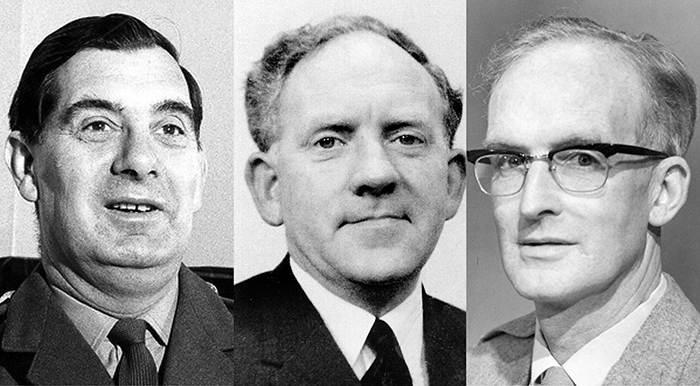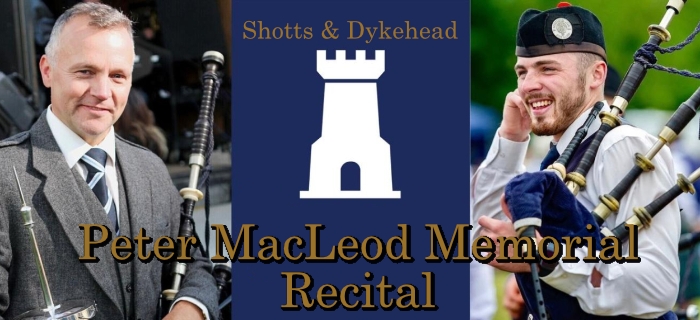
Fifty years ago three giants of piping were locked in a negotiation that was to change the face of the music in this country. Captain John MacLellan (l), John MacFadyen (centre) and Seumas MacNeill, our own ‘Three Wise Men’, were about to convince the civil service bods at the Scottish Education Department that the national instrument, the great Highland bagpipe, should be a suitable instrument for the country’s music exams. This they did. Suddenly boys and girls could take their ‘O’ level exams in that instrument – and henceforth schools had to provide the teachers to enable them to do so. It was a lasting achievement of as much significance as any in piping. This is how one of those heroes, John MacFadyen, reported on the matter in an article for the Oban Times in 1973…..
Whatever this year brings forth on the piping scene, last year will be remembered by many for the dramatic increase in the teaching facilities provided by two education authorities at home, the estalishment of new summer schools abroad and the introduction of the first Inter-Continental (almost said missile) Pipe Band Competition in Toronto.
On the home front the accolade should surely be shared by Ross-shire and Inverness-shire – the former, although entering the field later than some authorities, has made up for this already by employing John Burgess as a full-time instructor and is in the process of employing at least two more, one on Lewis and the other based in the Kyle-Plockton area [subsequently Iain MacFadyen].
The salary and conditions of service advertised are reasonable, and the former more generous than history would suggest, so it is safe to assume that candidates of merit will be attracted.
Not that the areas to be favoured are more in need of piping teachers than others. In fact the reverse may be true, for a lot of work has been done in the Kyle area by George MacKenzie and others over a number of years, and, through the establishment of piping classes in the Nicholson Institute taught by Pipe Major Willie MacLeod late of the Seaforths (whom I remember causing a stir by his excellent playing at a Uist & Barra competition in the late ’40s), and the revival of the Lewis Pipe band, both areas have been comparatively well served.
Inverness-shire was one of the first counties to recognise the need for piping instruction in the schools. With Pipe Major Farquhar Maclntosh teaching in Skye full-time, Mr J MacLeod, Principal Gaelic teacher, taking a chanter class in Tarbert, Harris, and with the recent appointment of Roddy Gillies to South Uist and Benbecula, the islands are being well catered for by comparison with former years.
When you add this to the services of Dr Kenneth MacKay at Kingussie High School and Iain Fraser at Deshar, instruction in piping is being provided for a number [of pupils] in the order of 200-250 per week during school hours [author’s emphasis].
Other education authorities are making some day-school provision, but one hopes that 1973 will see an increase in the appointment of instructors so that the epic decision of the SED [Scottish Education Department] to introduce the ‘O’ grade examination in piping will be supported by the further provision, on a national basis, of practical instruction within the school curriculum.
In many areas piping comes under the umbrella of further education and for years valuable work has been done in this way in Glasgow and elsewhere, but this is at best a substitute, and, with the raising of the school leaving age to sixteen, probably an anachronism for those under that age.
North America
Abroad, 1972 saw the establishment of at least three new summer schools in North America; two in California by Seumas MacNeill and John MacLellan, and in North Carolina by the writer. All three were booked virtually to capacity and were in addition to the two already established by Donald MacLeod in Nelson and Saskatchewan; in Spokane, Washington, where this year the principal instructors were Bob Hardie and Andrew Wright; by the writer in Ontario; by Seumas MacNeill in Ontario where he was assisted by Iain MacFadyen and Tommy Pearston, and at Invermark in New York State by Donald Lindsay where the late RU Brown was scheduled to teach.
This shows the tremendous expansion of interest in piping in North America in recent years and the appeal of the bagpipe when well played. It also shows the tremendous debt that piping owes to people like Donald MacMillan and Sandy Jones who, by their expert skills and enuthusiasm for passing on their own knowledge, have inspired some to learn and many to appreciate and support.
Without their lead and groundwork, piping in North America would not be where it is today. Flying visits stimulate and polish but only rarely create.
- Calling all PP readers. Were you a beneficiary of any of these teaching initiatives either at home or overseas. Why not scratch that memory bank and share some stories of your time at Nelson, Invermark, Kingussie or Kyle? We owe it to the teaching pioneers to keep their memory and their achievements alive. RW

















I have attended the North American Academy of Piping and Drumming (Sandy Jones’s summer school which he established with John MacFadyen) most summers since 2001. Sandy has done a remarkable job in teaching and in promoting interest in the bagpipe in the U.S. for many years. Sandy certainly deserved the Balvenie Medal he was awarded several years ago.
The early and formative years for the Summer School of Piping at Couer d’Alene, Idaho began in Spokane, Washington with John MacLellan in the mid 60’s. The original School was in Spokane for two years and then moved to Couer d’Alene for so many years after. John MacLellan ‘turned on the lights’ for so many during his time as the ‘Chief Instructor’ in the early years of this Summer School. For a lot of us it was the first and so very important influence by such an amazing Scottish Piper. These early years, led by John, continued at Couer d’Alene with many great teachers, more especially the many years by Bob Hardie and Andrew Wright!
Also during this time, Donald MacLeod was teaching at Summer Schools, firstly at Fort San in Saskatchewan and later at Nelson, British Columbia. They all made huge contributions to all their Canadian students!!
This article brought back many memories of attending the school in Coeur d’Alene, Idaho, which I think must be the school mentioned as being in Spokane, Washington. The two towns are only about thirty miles apart from each other, and that school was founded by John MacEwing, who lived in Spokane. Before I attended that school, however, my father helped Jack Ironside organize a week’s course with Captain MacLellan in Seattle. The first year it was held at St. Mark’s Cathedral and the following years at Seattle Pacific University. Captain MacLellan’s instruction and influence was profound.